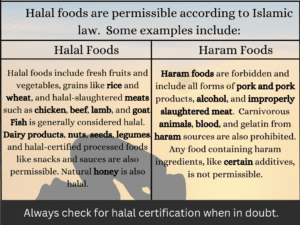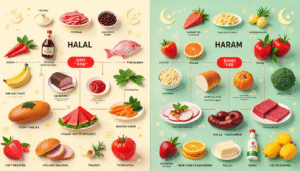The food and drink a Muslim uses are a form of worship, not only about what tastes best or benefits health. Allah’s revelations explain clearly what people can and cannot eat in the Qur’an and Hadith. These dietary rules, known as Islamic laws, determine what over 1.9 billion Muslims eat.
This guide explains the meanings, kinds, examples, and a detailed checklist of halal and haram foods according to Islamic rules.
What is Halal Food?
Halal is an Arabic word meaning permissible or lawful. When referring to food, halal means any food or drink that is allowed under Islamic Shariah law.
To be halal, a food item must:
-
Be free from any forbidden (haram) substances, such as pork or alcohol.
-
Be pure, safe, and clean.
-
If it is meat, it must come from a lawful animal slaughtered in the name of Allah following the Zabiha method.
-
Not involve cross-contamination with haram substances during processing, packaging, or handling.
The Qur’an clearly states:
“O you who have believed, eat from the good things which We have provided for you and be grateful to Allah…”
(Surah Al-Baqarah, 2:172)
What is Haram Food?
Haram means forbidden or prohibited in Islam. Haram foods are strictly disallowed, and consuming them knowingly is considered sinful.
Food becomes haram if:
-
It contains or is derived from substances prohibited in Islam.
-
It is harmful to the body or mind.
-
It is produced using unethical or impure methods.
-
The name of Allah was not mentioned during slaughter.
-
It was slaughtered improperly or died before slaughter.
The Qur’an says:
“Forbidden to you are dead animals, blood, the flesh of swine, and that which has been dedicated to other than Allah…”
(Surah Al-Ma’idah, 5:3)
The Significance of Halal Consumption in Islamic Teaching
Many believe that consuming halal foods or foods that are considered halal food is the right thing to do according to Allah’s orders. The Quran emphasizes the importance of consuming lawful and pure food:
Quranic Reference:
يَا أَيُّهَا الَّذِينَ آمَنُوا كُلُوا مِنْ طَيِّبَاتِ مَا رَزَقْنَاكُمْ وَاشْكُرُوا لِلَّهِ إِنْ كُنْتُمْ إِيَّاهُ تَعْبُدُونَ
Translation:
“O you who have faith, enjoy the permissible things which Allah has allowed for you and recognize Allah if it is Him that you do worship.”
(Surah Al-Baqarah, 2:172)
Thus, by eating only halal foods, Muslims contribute not only to their physical health but as to the religious aspect, as well.
Halal Food List in Islam (Permissible Items)
Here’s a list of foods that are considered halal in Islam:
1. Meat from Permissible Animals
Laal and animals like cows, goats, sheep, and camels are also allowed as Halal, but the method in which they are killed is most important, which in Islamic perspective is known as Zabiha or Dhabiha. This has to do with things like saying Bismillah when slaughtering the animal, and making sure the animal is killed in as humane a way as possible.
Halal meats include:
- Beef
- Lamb
- Chicken
- Goat
- Fish and seafood: all meat that has scales, except the products from mollusks, depending on the variety of the species.
2. Plant-Based Foods
Halal foods are recommended; however, any plant-consumable food and vegetable prepared in any way or form is permitted, except those that are toxic or have a tendency to be poisonous to the human body. This includes:
- Fruits
- Vegetables
- Legumes
- Nuts
- Grains
3. Dairy Products
Milk and other products such as milk cheese, yogurt, and butter are halal unless they contain non-halal materials such as gelatin or enzymes in their manufacture.
4. Grains and Cereals
Rice, wheat, oats, barley, and all grains and cereal products are permissible in Islam if they are not mixed with any other non-Halal food.
5. Beverages
All drinks are allowed, provided they are not alcoholic. Halal beverages include:
- Water
- Fruit juices
- Milk
- Coffee and tea, excluding beer, wine, spirits, and any form of mind-altering substance.
Halal Food List in Islam (Permissible Items)
The eating habits of Muslims also prohibit them from taking particular foods or drinks. Here’s a list of foods that are considered haram:
1. Pork and Pork By-products
Pork is explicitly prohibited in the Quran, and this includes all pork products and by-products, such as:
- Bacon
- Ham
- Pork sausages
- Lard (pork fat)
Quranic Reference:
حُرِّمَتْ عَلَيْكُمُ الْمَيْتَةُ وَالدَّمُ وَلَحْمُ الْخِنزِيرِ
Translation:
Forbidden to you [for food] are dead animals, blood, the flesh of swine…
(Surah Al-Ma’idah, 5:3)
2. Dead Animals (Carrion)
The meat of an animal that dies a natural death or whose throat is not cut, and it dies later (like carrion), then it is haram. This consists of animals that died of illnesses, in mishaps, or were gored by other animals.
3. Blood
The drink of blood, without food or with it, is haram. This is perhaps manifested through products like blood sausage and other dishes that mainly consist of blood.
4. Alcohol and Intoxicants
The Religions of Islam consider any substance that can bring on any sort of inebriation to be forbidden. This includes:
- Any kind of liquor (wine, beer, whisky, vodka, etc)
- Products made from alcohol or alcohol-bearing products
- The strain that can reduce the capability of an individual to make the right decision due to taking recreational drugs and substances
Quranic Reference:
يَا أَيُّهَا الَّذِينَ آمَنُوا إِنَّمَا الْخَمْرُ وَالْمَيْسِرُ وَالْأَنصَابُ وَالْأَزْلَامُ رِجْسٌ مِّنْ عَمَلِ الشَّيْطَانِ فَاجْتَنِبُوهُ
Translation:
“O you who have believed, Indeed, intoxicants, gambling, [sacrificing on] stone alters [to other than Allah], and divining arrows are but defilement from the work of Satan, so avoid it.”
(Surah Al-Ma’idah, 5:90)
5. Animals Not Properly Slaughtered
Though the animal might be permissible to be consumed by Muslims, it becomes unlawful if the animal is not slaughtered in the Islamic way – Zabiha. This includes meat from a slaughtered animal that was not done in the name of Allah or meat from an animal that was killed by using an unlawful method.
6. Carnivorous Animals
Islam forbids the consumption of animals that have sharp teeth and hunt other animals, such as:
- Lions
- Tigers
- Wolves
- Dogs
Similarly, birds with claws (eagle, hawk) are also haram. Another example is the birds that have infected and dangerous talons are also forbidden.
Halal and Haram Food Additives
Most of the manufactured foods contain Preservatives, some of which originate from haram products. Common ingredients to watch out for include:
- Gelatin: Sometimes it might even be obtained from a non-halal source, such as pork meat.
- Enzymes: Some of these enzymes are employed when making cheese, and it has been discovered that they may originate from non-halal animal organisms.
- Alcohol: Infrequently seen in application in flavorings and extracts.
Muslims should ensure they are reading labels or buying products that state they are halal to avoid products that contain haram ingredients.
Halal and Haram Meat: The Most Critical Category
Meat is one of the most sensitive areas when it comes to halal and haram laws. Unlike fruits or grains, meat requires a specific Islamic slaughter method (Zabiha) to be lawful.
Conditions for Halal Meat:
-
The animal must be from a halal species (e.g., cow, goat, lamb, chicken).
-
The animal must be alive and healthy at the time of slaughter.
-
A Muslim must perform the slaughter.
-
The name of Allah must be mentioned before slaughtering.
-
The blood must be completely drained from the body.
Haram Meat Includes:
-
Pork or any of its derivatives.
-
Animals are slaughtered without saying “Bismillah”.
-
Animals that died on their own (carrion).
-
Carnivorous animals and birds of prey.
-
Meat that is mixed with haram ingredients, such as alcohol or pork gelatin.
-
Meat processed with non-halal enzymes or emulsifiers.
Even meat from halal animals becomes haram if these requirements are not fulfilled.
Why Halal Matters: Spiritual, Physical, and Ethical Purity
For Muslims, eating halal is not just about health or hygiene—it’s about following Allah’s command. Every bite consumed affects one’s spiritual state, acceptance of worship, and duas (supplications).
The Prophet Muhammad ﷺ said:
“Indeed, Allah is pure and accepts only what is pure…”
(Sahih Muslim)
Halal eating is also about:
-
Respecting animal welfare (humane slaughter).
-
Avoiding harmful substances.
-
Ethical food production.
How to Ensure Your Food is Halal
Living in a non-Muslim country or eating packaged food makes it harder to know what’s halal. Here are some practical tips:
-
Check for Halal Certification – Look for official halal labels.
-
Read Ingredient Labels – Watch for hidden haram substances (e.g., gelatin, rennet, emulsifiers).
-
Ask or Inquire – Contact food manufacturers or restaurants if unsure.
-
Avoid Doubtful Items – When in doubt, leave it out.
-
Learn the Common E-Numbers – Many food additives are haram or doubtful (like E120, E441).
Conclusion: Stay Informed, Stay Pure
Understanding the difference between halal and haram food is a lifelong responsibility for every Muslim. As global food supply chains become more complex, it’s essential to be vigilant, informed, and proactive.
Adhering to halal guidelines strengthens your relationship with Allah, promotes clean and ethical eating, and protects your soul from impurity.
“So eat of that [meat] upon which the name of Allah has been mentioned, if you are believers in His verses.”
(Surah Al-An’am, 6:118)




